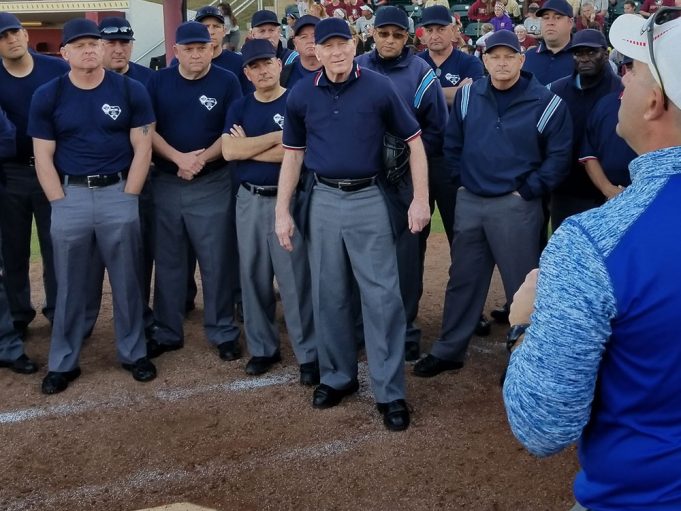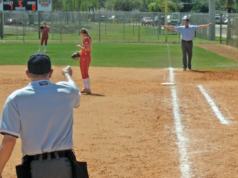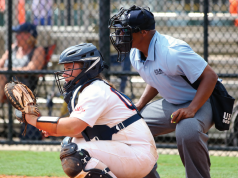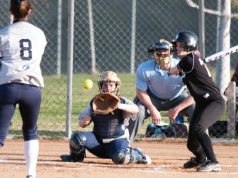A
s the majority of spring sport seasons never got off the ground, many umpires didn’t have the chance to hone their skills and work on new ones developed in the offseason. Umpires throughout the country missed out on opportunities to attend camps and develop new skills as social distancing became the new norm. As the summer and fall seasons get underway, umpires are looking for ways to knock off the rust, get back into action and learn new skills.
One of the best ways to do this is through camps. Whether a new umpire looking to get direction or a seasoned veteran looking to potentially move up the ranks, camps are highly recommended for all umpires. While camps can sometimes be daunting, they should provide a sense of excitement and enthusiasm as everyone in attendance should have two common goals — improve skills and learn from some of the top minds in the game.
As camp season gets underway this fall, I turned to three leaders in the world of softball to get their insights to help campers get the most out of the experience and find out what they look for in umpires while instructing and evaluating. There are several themes and commonalities to each and provide solid advice to anyone heading to a camp in the near future.
 First-time campers can be overwhelmed when they attend a camp. What is your advice to them on how to stay calm and get the most out of the camp?
First-time campers can be overwhelmed when they attend a camp. What is your advice to them on how to stay calm and get the most out of the camp?
Cornwell: First-time campers should remember that every umpire and camp evaluator was a first-time camper and umpire once, too. There is no need to be nervous. The purpose of camp is to learn new skills to improve your game. Evaluators are there to help and will point out areas for improvement. Coming to camp with an open and growth mindset is the most helpful.
Drumm: When umpires are starting to explore attending a camp, I highly suggest they talk with a trusted mentor that is respected and knowledgeable about that code or camp in advance. This can be extremely helpful as the first-time camper can get good advice assisting in proper preparation. First-time campers should be knowledgeable and prepared to work the rules and mechanics associated with that camp. They should set realistic goals they want to accomplish for this camp. Campers should remember no one is looking for perfection. Keep it simple; softball is softball. Despite the different codes and the differences in rules and mechanics, the core and basics between all of them are the same. The camper should perform the basic umpiring responsibilities well each game and at each position.
Raynor: Remember, this is softball. It’s a lot of fun and a great therapy in a unique setting that allows umpires to administer the rules of the game, often around great coaches and players. My suggestion would be to develop a pre-camp strategy for yourself that allows you to learn as much as possible from someone at the camp that has accomplished some of the goals you aspire to achieve. Be a good listener, stay focused on the things that matter and try to pick up skills that are appropriate for you and your current level of play. Be a thinker and go into the camp listening and looking for little things that make a difference for you and your goals. Look sharp and impress with your work on the field and in controlled discussions. You cannot talk your way into an assignment, but your work and your actions can get you on the field. Relax and enjoy the moment.
We often talk about umpires having “it” when it comes to climbing the ladder. In your mind, what is the definition of having “it” and what is it that you look for when deciding which umpires to hire for your staff or for national events?
Cornwell: The “it” factor is so hard to describe and define. Each conference I serve demands a specific skill set, so I look for umpires who possess those skills and/or the potential to learn them. College softball is a fast and exciting game. I need umpires with the physical fitness and agility to keep up with the speed of the game. I seek to hire umpires who have a strong work ethic, integrity, good communication skills and a professional demeanor. An umpire who is eager to learn and who is always striving to be better than their last game is an asset to any staff.
Drumm: The “it” factor is hard to define. Again, not expecting perfection, but campers that observers start talking about and promoting to elite national championships or recommend to college coordinators are ones that have a good understanding of the philosophy and intent of the rules and the mechanics of the code they are working. It is important they have a growth mindset and are goal oriented. They possess great communication skills both visually and verbally on and off the field. They are humble and exhibit self-evaluation skills during their pre(games) and postgames. They can make timely and appropriate adjustments based on unique situations in their game or on their next game based on feedback. They trust their umpiring ability and exhibit those behaviors on the field instead of trying to “talk up” their abilities. They truly care about the success of their crew members, too.
Raynor: Confidence, composure, competence, calmness, clarity and the ability to work with coaches in a careful and tactful manner usually identifies the “it” factor in high-level umpires. Anyone can learn to call balls and strikes, fair/foul, and quite often get pretty good at safe/out. It’s when other things happen that makes a bigger difference. Game- management skills often separate the top-tier umpires from the pack. Great umpires don’t talk very much. They stay focused and stay in the moment. They’re usually easy to spot. These umpires with the “it” factor know that the game is about the players, coaches and the performance around the work of the umpire team as a crew.
Umpires need — for some camps — to present a different and challenging approach to umpire development and growth. I am often amazed as to how umpiring and our game have progressed and changed over the past 20 years or so. It takes a commitment to get onto the NCAA umpiring bus, and dedication to stay there.
Is there one thing (or possibly more) you see campers doing that most hurts their chances of advancing?
Cornwell: Umpires should prepare for a camp like they would prepare to work a game. Preparation includes knowing the rules and basic mechanics, having the correct uniform that is cleaned and pressed, being physically fit and able to perform to the level required, and being eager to learn and implement new skills. Umpires who come to camp to brag about their accomplishments, put other umpires down, make excuses on the field or try to “one up” the evaluators may not get the most out of their camp experience.
Drumm: Campers who are argumentative or give excuses when they receive feedback from partners and/or observers are red flags. Campers who continually talk about themselves to try to add credibility to their work — those individuals seem to not be interested in being a team player or getting better.
Raynor: Too much non-essential talking is often a turnoff and a detriment to advancement. Many umpires are simply “high maintenance” for coordinators and schedulers, and these umpires quickly work their way to the back of the pack. When you are on the stage, perform. When you are asked to talk, carefully pick your reply. Actions speak volumes, and make sure that your actions become the ticket to your growth. Your promptness, thoroughness to an appropriate level and timeliness within the appropriate window make good impressions. Talking and smiling on the field is too often inappropriate and perceived as out of order. Be careful how you look to others. Body language is critical, too. At this level, let your body language be a tool for reinforcing your strengths and skills, not your lack of confidence or poor judgment on a recent call.
Is there one thing (or possibly more) you see campers doing that most positively affects their chances of advancing?
Cornwell: Many coordinators look to hire umpires who are physically fit, work hard, demonstrate skills appropriate for the level of play, and who are professional on and off the field. Umpires who come to camp with an open mind and positive attitude, who listen and implement what the evaluators are sharing with them, and demonstrate good judgment and communication skills tend to be the most desirable candidates.
Drumm: Campers that have a positive attitude, participate as a good crew member and absorb the entire experience leave a positive impression on observers. Additional positive attributes of the campers; they are open-minded, listen well and ask questions to clarify understanding. They take advantage of increased learning opportunities by quietly sitting in on other crew debriefs and sitting and listening to observers watching games. Then campers demonstrate what they learned based on on- and off-field performance.
Raynor: The way they communicate, listen, respond, reply, focus, refocus and adjust to the ever-changing environment of a ballgame. Be in the flow. Be seen only when you need to be seen. Be quiet until you need to be heard. Look good, look the part. Be sure that from the moment you walk on the field, and until you leave the field, you work hard to be a great umpire. Remember always that this game is never about you. It’s about us, and together we can survive and advance to amazing experiences through NCAA softball umpiring.
What's Your Call? Leave a Comment:
Note: This article is archival in nature. Rules, interpretations, mechanics, philosophies and other information may or may not be correct for the current year.
This article is the copyright of ©Referee Enterprises, Inc., and may not be republished in whole or in part online, in print or in any capacity without expressed written permission from Referee. The article is made available for educational use by individuals.



















